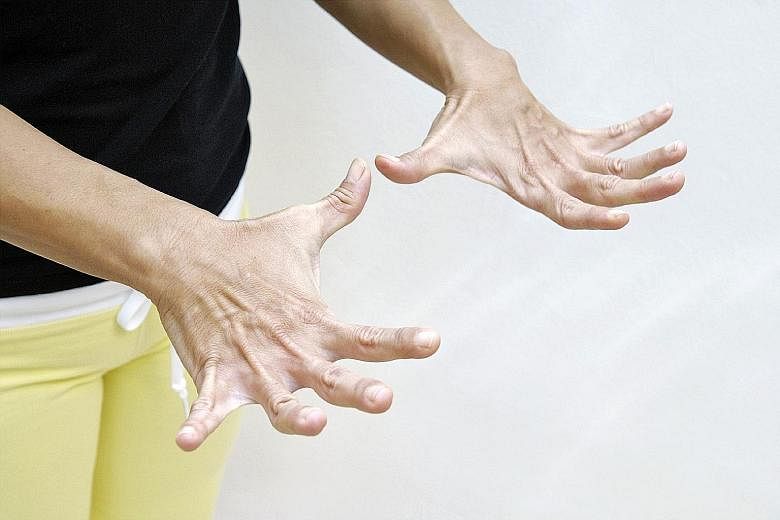Q My menopause set in about 18 months ago. Since then, I have been hearing sounds when I move my joints. About a year ago, I began experiencing stiffness in the last two fingers of my left hand when I woke up, regardless of my sleeping position. The stiffness now affects the last three fingers of both hands.
However, once I get up from a sleeping position, the stiffness goes away in a minute. The stiffness also goes away when I loosely clench my hands while in a sleeping position.
Recently, I have muscle aches in my upper left arm when I stretch my hand, and I am unable to reach and touch my back.
Are all these symptoms pointing to a more serious condition?
I did weekly sessions of yin yoga for eight months from December 2013 to August last year. The joint noises started after these sessions.
Are my symptoms linked to yoga?
A Normal joint movements can cause some crackling or creaking sounds. This can occur in healthy individuals. Nonetheless, abnormal joint noises can occur when one has underlying joint conditions, including injuries or joint disease.
Crepitus - a crackling or grating sensation or sound occurring in the joints - can indicate cartilage wear in the joints. It is a common symptom in osteoarthritis, a type of degenerative joint condition. Other conditions, such as rheumatoid arthritis, can also cause crepitus.
Meanwhile, finger stiffness can be a symptom of several conditions, such as joint disease and tendon problems like trigger finger.
Clues to the presence of trigger finger include pain or a bump at the base of the affected fingers, a clicking sensation as well as the occurrence of catching, snapping or locking when moving or bending the affected fingers.
If one has an inflammatory joint disease, such as rheumatoid arthritis, he may experience prolonged early morning stiffness of the joints, often for more than an hour. The joint stiffness also typically improves with physical activity.
On the other hand, if the problem stems from a mechanical joint disease, such as osteoarthritis, early morning stiffness usually lasts no more than half an hour. The joint symptoms also tend to get worse with physical activity and would improve with rest.
There are various causes of upper arm pain or shoulder pain.
Broadly speaking, this may be due to problems from the joint itself (arthritis), structures around the joint (bursa inflammation or tendon inflammation) or "referred" pain from other parts of the body, such as the neck.
You said that the symptom crops up when you stretch your hand and that you are unable to reach and touch the back. I wonder if you are describing pain that may be movement-related.
Pain from tendon problems around the upper arm or shoulder region (biceps tendinitis, rotator cuff tendinopathies) can be aggravated by specific movements, such as reaching up with the arm. As there are various conditions that can be associated with the symptoms that you have described, it is best to get a formal consultation with a health professional. It is also important that more serious conditions, such as rheumatoid arthritis or injuries, are not missed out.
Generally, during the diagnostic evaluation, relevant history-taking and a physical examination, as well as other investigations, such as laboratory and imaging tests if required, will be necessary to help arrive at the likely diagnosis.
The first step would be for you to get a formal evaluation with a rheumatologist to ascertain if you have any rheumatologic conditions. It is difficult for me to comment, based on the description of your symptoms, whether there is any link to your weekly yoga sessions. If you have specific questions regarding yoga in relation to your symptoms, it would be best to raise these when you visit your doctor.
Consultant in the department of rheumatology and immunology at Singapore General Hospital
GOT A PROBLEM? E-mail your question to sthealth@sph.com.sg. Specify Ask The Experts as the subject and include your name, age, gender, identity-card number and contact details.
DR TAN YORK KIAT


